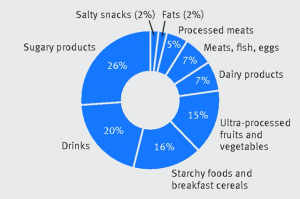
Frankenstein Food: A Healthy Look into Plant-based Meat
By Jeffrey Lupo
The mad scientists have cooked up something new. It walks and talks like the real deal, but the stitches say otherwise. If you’re appalled, confused, or curious about “plant-based meat,” you’re not alone. Climate change, ethics, politics, and economics are all part of the plant-based conversion. In this article, we’ll look at two specific aspects of the movement: health and marketing.
Is plant-based meat good for you? While many believe it’s the key to saving the planet, that’s not why products like the “Impossible Burger” and “Beyond Meat” have gone viral. Culinary innovations paired with smart, well-timed marketing offer a proven formula for big business success. Companies like Coca-Cola, McDonald’s, and Starbucks know it well, but even these old giants have to bend to new health trends. Will plant-based meat make the cut or even replace traditional carnivorous options? Do we need to redefine the term “meat” altogether?
What Is “Plant-based Meat”?
We can define “plant-based meat” as meat-like products made from plants. “Veggie burger” poses nothing new (or exciting) but serves the same purpose. Why the new name? The term “plant-based meat” is easily confused with other grocery store buzzwords like “grass-fed beef” and “grain-fed chicken.” We are faced with a new grocery store label that appears to mislead and or persuade rather than describe.
Rebranding of proven concepts (terry cloth as ShamWow, high-intensity workouts as P90X, and every “new” diet trend that comes along) follows the marketing proverb of “don’t reinvent the wheel.” Originality is prestigious because it’s expensive, time-consuming, and altogether risky. Most companies aren’t avid investors of the genuinely new and novel. “Plant-based meat” continues the formulation of clever names for animal-product substitutes.
Creative headlines (name of the product) and well-written product descriptions (ingredients on the label) aren’t the only things “new” that plant-based meats offer. Flavor matters, especially to someone who’s never met a tofurkey dinner or kale salad that she liked. Herein lies the culinary innovation, the real meat of the argument.
Effective marketing might get you to bite, but then it’s your taste buds that need convincing. Every carnivore is an expert on what a good burger smells and tastes like. Conversely, every vegan has had their share of good, bad, and ugly veggie burgers. Beyond Meat and the Impossible Burger appear to deliver a flavor that justifies a price point that’s higher than cow-based beef. That’s nothing to scoff at. In fact, that’s a recipe for the trending success that’s sweeping across the country.
Is Plant-based Meat Actually Meat?
No, it’s not meat. Rebranding the veggie burger proves an impressive feat; applause is in order. You’re not just eating a veggie burger anymore. You’re saving the Planet. That’s the idea that smart businesspeople are using to motivate your purchase. But if you’re curious about what makes meat meat, we can go a little deeper.
It’s important to note that meat of any kind is considered “food.” In the world of nutrition, there’s a difference between food and food products. The Impossible Burger, as well as Beyond Meat, are processed products. As such, are definitively food products.
When hearing a word like “burger” or “sausage,” most automatically recognize these terms as animal product. However, company stakeholders believe it’s time to reformulate the definition of meat when it comes to edible protein.
Ethan Brown, CEO of Beyond Meat, has gone as far to state it’s a “better type of meat” and that “meat is really five things: It’s amino acids, lipids, trace minerals, vitamins, and water,” and that this is a “decent definition of what meat is.”
Does he have a point? When we dig into nutritional biology, are we posed with the same core ingredients? In essence, have modern-day scientists created meat from plants
Prominent health professionals and proponents of the carnivore diet say otherwise. Here, according to nutrition science, are some of what you can only get from animal-based meat:
- B12 (vitamin)
- L-carnitine (amino acid)
- Carnosine (dipeptide amino acid molecule)
- Choline (nutrient)
- Creatine (amino acid)
In addition to these essential nutrients, vitamin levels are not the same in traditional beef as found in plant-based meats. The nutrition facts and ingredients on the label may seem compelling at first glance but, in actuality, offer little more than surface-level information.
Is Plant-based Meat Healthy?
Processed foods haven’t done many favors in preventing cancer or helping to fight against obesity, diabetes, or heart disease. In fact, the evidence is clear that processed foods are an undeniably huge contributor to these illnesses.

Relative contribution of each food group to ultra-processed food consumption in diet
Yet, we’ve all heard that vegetables are inherently healthy, and, more importantly, more healthy than meat.
While the carnivore versus vegan mammalian-evolution debate continues, we can presently identify a few red flags stuck in your plant-based burgers. These are everyday things that contain a vast host of scientific data suggesting harm to your health.
- Artificial Dyes (beetroot dyes, alternatively, are gaining popularity)
- Genetically Modified Organisms (Depending on your definition, this includes things like Wheat and most Tomatoes)
- Soy and Soy Lecithin
- Canola Oil
- Non-organic ingredients (Which may consist of a hydroponically grown crop)
- Hard-to-pronounce words
Whole foods, no matter which set of dietary guidelines you subscribe to, have repeatedly demonstrated their superiority in comparison to anything processed or refined. The medicinal properties present in whole food aren’t what make your mouth water. But robbing your system of the expected medical reinforcements must now become part of the conversation.
Can I Trust the Label?
The Plant Based Food Association (PBFA) has announced the labeling standards regarding plant-based meat. Specific terms or variations must be included (including “plant-based”), but that doesn’t mean less officially recognized titles are prohibited.
To better arm your powers of perception, here’s a list of suspect marketing terms typically meant to mislead you into buying than taking care of your health:
- “All natural”
- “Fat free” & “Light”
- “No sugar added” & “Sugar free”
- “Zero trans-fat”
- “Boost immune system”
- “Made with real…”
The discerning buyer will take note that these are marketing terms meant to compel a purchase, not to benefit one’s health.
The Bottom Line
Protein, carbohydrate, and fat amounts along with flavor and texture may scream “meat!” but your gut may scream something different. Nutritional labelling, at this stage in the game, is not serving the once-intended purpose of entirely informing consumers. The perception of what is and what isn’t meat hangs in the balance.
Whether you’re practicing environmentally or economically conscious eating habits, I urge you not to forget about your health. Chronic diseases like diabetes, heart disease, and obesity are and have been at epidemic levels in the United States for some time to date. We’ve been barraged with these sorts of health problems for so long that they can feel like old news. It may be accurate, but it doesn’t make these risks any less imminent.
The stakeholders behind Beyond Meat and the Impossible Burger want to see their visions come to fruition, and that can only be done by earning a profit. As always, your health, ultimately, is and always will be your responsibility.
Links:
- https://images.fastcompany.net/image/upload/w_596,c_limit,q_auto:best,f_auto,fl_lossy/wp-cms/uploads/2018/07/i-burger.jpg
- https://www.foodmanufacture.co.uk/Article/2020/03/04/Plant-based-food-grows-in-US
- https://www.youtube.com/watch?v=4uGmnBunJjc&t=27s
- https://carnivoremd.com/
- https://articles.mercola.com/sites/articles/archive/2020/02/23/carnivore-code.aspx
- https://encyclopedia.thefreedictionary.com/b12
- https://encyclopedia.thefreedictionary.com/L-carnitine
- https://medical-dictionary.thefreedictionary.com/carnosine
- https://encyclopedia.thefreedictionary.com/choline
- https://encyclopedia.thefreedictionary.com/creatine
- https://www.thelancet.com/journals/lanpub/article/PIIS2468-2667(18)30267-6/fulltext
- https://www.bmj.com/content/360/bmj.k322
- https://www.bmj.com/content/bmj/360/bmj.k322/F1.large.jpg
- https://www.nature.com/articles/ncomms14319
- https://www.foodnavigator.com/Article/2020/03/03/Naturex-introduces-red-colouring-for-meat-substitutes
- https://www.wheatbellyblog.com/2014/09/wheat-worse-gmo/
- https://www.nytimes.com/2013/06/24/booming/you-call-that-a-tomato.html
- https://www.thehindubusinessline.com/economy/agri-business/food-grown-without-mud-is-not-organic-says-us-farmers-lawsuit/article30974638.ece
- https://www.npr.org/templates/story/story.php?storyId=89876927
- https://pubmed.ncbi.nlm.nih.gov/26192884-dietary-fruits-and-vegetables-and-cardiovascular-diseases-risk/?from_term=whole+food&from_pos=5
- https://www.greenmedinfo.com/keyword/whole-food-superior-isolated-partsonsumption
- https://plantbasedfoods.org/wp-content/uploads/PBFA-Labeling-Standards-for-Meat-Alternatives.pdf
Jeffrey Lupo is a digital content marketer and freelance writer from Houston Texas. His areas of focus are in natural health, prevention, and nutrition. He is currently growing his business to service start-ups, private practices, and non-profit organizations in the health and wellness field.


Leave a Reply